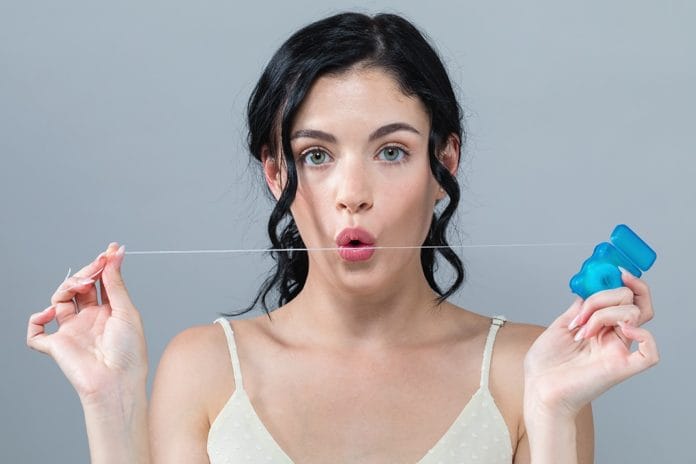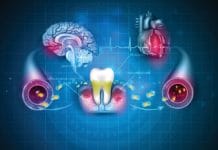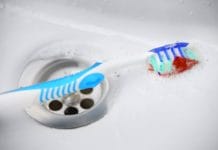Currently, more people are flossing than ever! However, don’t get excited… They are flossing their bodies not their teeth (you know you have tried it!) If I could get my son to be as diligent with his math as he is with his floss dance, he would become the next Albert Einstein. Flossing, such a simple concept yet practiced by very few. In fact, in a 2015 poll, 36% of Americans stated they would rather clean the toilet than floss.[1] This single aspect of oral hygiene is probably one that dental hygienists preach more than any other. I sometimes feel no less than a broken record.
Flossing, a term used for interdental cleaning, includes not only dental floss but dental pics, oral irrigators, and small brushes. Flossing has officially been around since 1812 when a dentist, Levi Spear, introduced flossing to the world via his book titled “A Practical Guide to the Management of the Teeth.”[2] It was not, however, until 1874 that the first patent was given to dental floss. Floss was originally made from silk which was costly, thus decreasing the use by people as they couldn’t afford it. Eventually, it was recreated with nylon making it more affordable.
I will admit I didn’t grow up flossing as I should have. However, I was quick to grab that special string when something was stuck between my teeth. When I began dental hygiene school in 2004, I was ashamed of my practice, or lack thereof, and quickly made it a point to acquire the habit (don’t judge me.) And habit it must be, as no one will do something in life routinely unless it is a habitual part of their daily regimen. I can proudly say I have been flossing faithfully for almost 15 years.
One of the first things dental professionals are taught is proper oral hygiene care and how to help educate our patients. Brush, floss, rinse is at the core of that education. I have never questioned this routine, nor have I found myself staring in the mirror wondering why on earth I floss. It’s a simple, yet efficient, way to remove plaque/debris which becomes lodged between our teeth. However, a few years ago the act of flossing was questioned leaving many professionals infuriated, and many non-flossers feeling validated.
In the latter part of 2016, The Associated Press questioned The Department of Health and Human Services and Agriculture for scientific evidence that proves the effectiveness of flossing. The federal government admitted flossing had not been proven to be effective and removed it from the dietary guidelines, which are published every five years. The government then stated in a letter to The AP that the effectiveness of flossing had not been properly researched, as required.[3] The AP went on to report that a dental magazine stated that flossing benefits are so minute that it wouldn’t be noticed by users (GASP!). They failed to state which magazine this misinformation came from of course. That is essentially all that society needed to hear before throwing away their floss and interdental cleaners without a second thought.
What people failed to read was the studies conducted were poor. One study only evaluated patients after a single use of floss. That’s like expecting a supermodel body after one day in the gym. Rome wasn’t built overnight friends. According to the ADA, a meta-analysis of studies on the impact of flossing on interproximal caries showed a significant reduction on interproximal caries that was not seen with intermittent (every three months) flossing.[4]
In terms of managing gingivitis, The Cochran Systematic Review found the evidence on this topic is very low quality due to the uncertainty about the estimate because of the small number of studies, sample sizes, and some concerns on how the results were interpreted.[3] Periodontal disease can take years to develop, and unfortunately, these studies ranged mostly from a few weeks to a few months. While these studies may not prove the effectiveness of flossing, they also didn’t prove that it wasn’t effective simply because of the poor quality and outdated variables.
A spokesperson from The Department of Health and Human Services and Agriculture stated flossing was removed from the dietary guidelines because brushing and flossing were not considered because a larger emphasis was placed on reducing dietary sugars. Since neither the 2010 and 2015 Advisory Committees reviewed evidence on brushing and flossing, it was decided not to carry forward the information on brushing and flossing included in past editions of the guidelines.[5] They were not implying it is not an important hygiene practice.
Ask any dental professional about the effectiveness of flossing, and they are sure to quickly expel the vast amount of knowledge they have acquired not only from school but also from occupational experience throughout their career. After all, dental professionals treat thousands of mouths a year. If anyone understands and knows the significance of flossing it is us, as it is embedded into our DNA. One dentist, Wayne Aldredge, then president of The American Academy of Periodontology, said it best when he said, “it’s like building a house and not painting two sides of it. Eventually, those two sides will rot quicker.”[3] Or we can be completely blunt and realistic and use the ever-popular phrase, not flossing is the equivalent of wiping your butt cheeks and skipping the crack. Sorry, not sorry.
Flossing disrupts and removes biofilm (bacteria filled gunk) that can lead to unhealthy periodontal tissue and interproximal caries. Not to mention at least 90% of diseases/illnesses have an oral manifestation, thus increasing the need for a cleaner healthier mouth.[6] While an efficient study on floss does not exist currently, the proof is in the pudding. Some things are merely common sense. It is better to practice the inexpensive task of flossing than take a chance on not, and paying a much higher cost as the health of the mouth can impact the overall health of the body. The benefits outweigh the risks. Before you discard your floss or interdental aides, I leave you with this. If flossing is not beneficial, then how did one study conclude daily flossing can add 6.4 years to your life expectancy?[7]
SEE ALSO: Gingival Recession: It’s Not the Toothbrush’s Fault
DON’T MISS: Topical vs. Systemic Fluoride: What Patients Need to Know
Need CE? Click Here to Check Out the Self-Study CE Courses from Today’s RDH!
Listen to the Today’s RDH Dental Hygiene Podcast Below:
References
- American Academy of Periodontology. “More Than a Quarter of US Adults Are Dishonest With Dentists About How Often They Floss Their Teeth.” American Academy of Periodontology, 23 June 2015, www.perio.org/consumer/quarter-of-adults-dishonest-with-dentists.
- Team, Water Flosser. “When Was Dental Floss Invented? | Know History.” Water Flosser, 26 Dec. 2017, http://waterflosser.co/when-was-dental-floss-invented/.
- Donn, Jeff. “Medical Benefits of Dental Floss Unproven.” AP NEWS, Associated Press, 2 Aug. 2016, https://apnews.com/f7e66079d9ba4b4985d7af350619a9e3.
- “The Medical Benefit of Daily Flossing Called Into Question.” American Dental Association, 2 Aug. 2016, www.ada.org/en/science-research/science-in-the-news/the-medical-benefit-of-daily-flossing-called-into-question.
- Sandoval, Edgar, and Reuven Blau. “Flossing Has No Proven Benefits, so U.S. Health Department Stops Recommending the Practice – NY Daily News.” Nydailynews.com, New York Daily News, 8 Apr. 2018, www.nydailynews.com/life-style/no-floss-u-s-health-department-article-1.2735915.
- “Diabetes? Heart Disease? Osteoporosis? Your Dentist May Know before You Do.” Delta Dental, Sept. 2012, www.deltadentalins.com/oral_health/dentists-detect.html.
- Vernon, Steve. “Church, Chocolate, Sex and 3 Other Keys to Living Longer.” CBS News, CBS Interactive, 22 Apr. 2011, www.cbsnews.com/news/church-chocolate-sex-and-3-other-keys-to-living-longer/.











